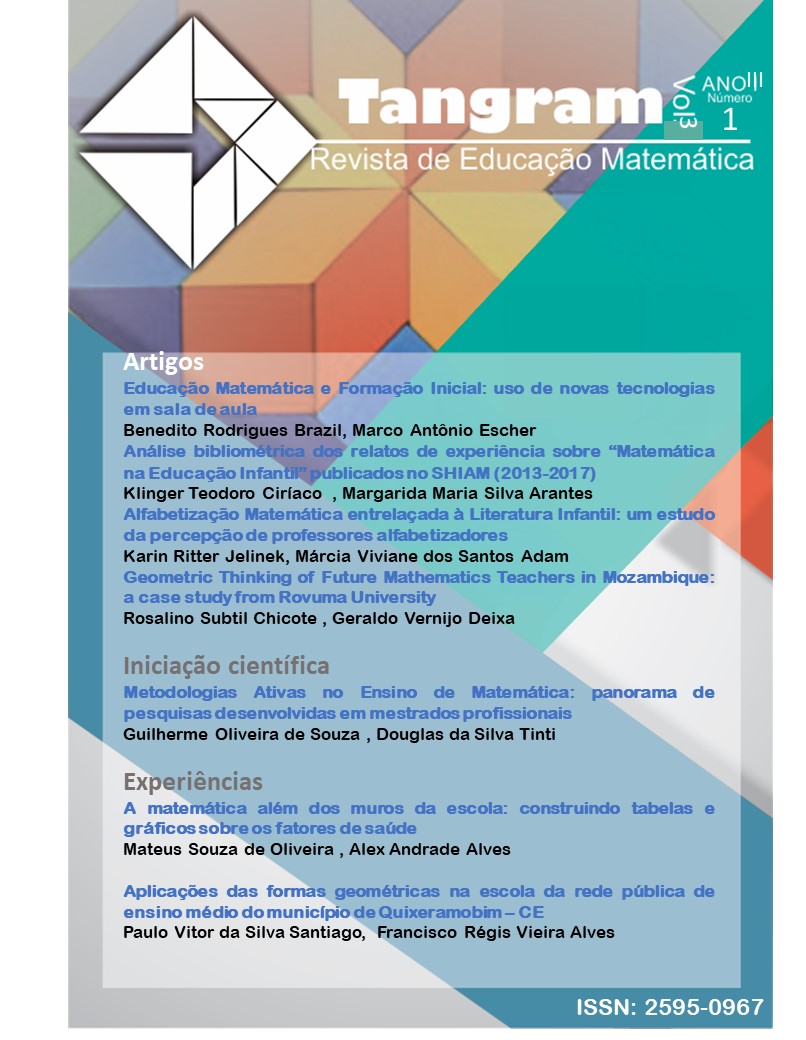Mathematical Literacy interlaced with Children’s Literature: a study on the perception held by literacy teachers
DOI:
https://doi.org/10.30612/tangram.v3i1.11038Keywords:
Children’s literature, mathematical notions, mathematical literacy.Abstract
It is noteworthy how primary and secondary students presently struggle to understand the concepts of Mathematics, as oftentimes they were unable to build mathematical notions that are fundamental to the literacy cycle. Another known fact is the importance of using diversified teaching strategies to allow students to build, during those years, the mathematical concepts that are held as the basis for their success in other educational stages. We understand that one alternative that is in line with this notion consists of interlacing mathematical literacy and children’s literature together. Over the past few years, Brazil’s Ministry of Education has been sending schools collections of literary works that bring in ideas which can be explored in various fields of knowledge, Mathematics included. Therefore, a qualitative research study with quantitative aspects was conducted with literacy teachers to find whether they think it is possible to use some of the stories for children found in such collections to introduce or build mathematical concepts.Downloads
References
Arnoud, Denise Soares. (2016). A Matemática presente em livros de leitura: possibilidades para a educação infantil. Disponível em https://lume.ufrgs.br/handle/10183/148194. Acesso em: 13 de out. de 2018.
Brasil. Ministério da Educação. (2012). Manual do PNAIC. Disponível em: http://pacto.mec.gov.br/images/pdf/pacto_livreto.pdf. Acesso em: 25 de out. de 2018.
Brasil. Secretaria de Educação Básica. (2014). Pacto Nacional pela Alfabetização na Idade Certa: apresentação. Brasília: MEC, SEB.
Dias, Rosimeri da Silva. (2019). Formação continuada de professores que ensinam matemática nos anos iniciais: espaço de (re)construção de saberes. 2019. 75f. Dissertação (Mestrado em Ensino de Ciências Exatas) - Universidade Federal do Rio Grande.
Dorneles, Beatriz Vargas; Lima, Elielson Magalhães e Nogues, Camila Peres. (2017). Aprendizagem da Matemática nos anos iniciais: conceitos e desafios. In: Piccoli, L., Corso, L., Andrade, S., Sperrhake, R. (Orgs.). PNAIC UFRGS: práticas de alfabetização, aprendizagem da matemática e políticas públicas. São Leopoldo: Editora Oikos. 139 - 158.
Fernandes, Michelli de Souza Novikoff de Oliveira. (2015). Literatura Infantil nas aulas de Matemática: uma estratégia facilitadora para o processo de aprendizagem. 2015. 38f. Monografia (Pedagogia) - FUNVIC-SP. Disponível em: http://www.bibliotecadigital.funvicpinda.org.br:8080/jspui/handle/123456789/309. Acesso em 13 de out. de 2018.
Gil, Antonio Carlos. (2010). Como elaborar projetos de pesquisa. 5. ed. São Paulo: Atlas.
Jelinek, Karin Ritter. (2015). Jogos nas aulas de Matemática: brincadeira ou aprendizagem? Saarbrücken: Novas Edições Acadêmicas.
Lopes, Celi Aparecida Espasandin. (2009). Escritas e leituras na educação matemática. Belo Horizonte: Autêntica.
Maia, Madeline Gurgel Barreto; MARANHÃO, Cristina. (2017). A alfabetização matemática na sala de aula: uma ideia a partir da ampliação do ensino fundamental (de 9 anos). In: MAIA, Madeline Gurgel Barreto Maia; BRIÃO, Gabriela Félix Org(s). Alfabetização matemática: tendências atuais. Curitiba: CRV.
Meirieu, Philippe. (1998). Aprender... sim, mas como? Porto Alegre: Artmed.
Moreira, Marco Antônio. (2011). Metodologias de Pesquisa em Ensino. São Paulo: Editora da Física.
Murbach, Marcia Costa Graichen. (2017). Histórias infantis e Alfabetização Matemática. 2017. 236f. Dissertação (Mestrado em Educação) – Programa de Pós-Graduação em Educação em Ciências e em Matemática da Universidade Federal do Paraná. Disponível em: http://acervodigital.ufpr.br/bitstream/handle/1884/49568/R%20-%20D%20%20MARCIA%20COSTA%20GRAICHEN%20MURBACH%20.pdf?sequence=1&isAllowed=y. Acesso em 18 de fev. de 2018.
Nacarato, Adair Mendes; Mengali, Brenda Leme da Silva; Passos, Cármen Lúcia Brancaglion. (2014). A matemática nos anos iniciais do ensino fundamental: Tecendo fios do ensinar e do aprender. 2ª edição. Belo Horizonte: Editora Autêntica.
Piccoli, Luciana; Corso, Luciana Vellinho; Andrade, Sandra dos Santos; Sperrhake, Renata. (2017). Apresentação. In: Piccoli, L., Corso, L., Andrade, S., Sperrhake, R. (Orgs.). PNAIC UFRGS: práticas de alfabetização, aprendizagem da matemática e políticas públicas. São Leopoldo: Editora Oikos. 13 - 18.
Rysdyk, Marcia Regina de Azeredo. A Matemática do Era uma vez. (2010). Monografia (Pedagogia) - UFRGS. 2010. 66f. Disponível em: http://www.lume. ufrgs.br/bitstream/handle/10183/36717/000818224. pdf?sequence=1. Acesso em 18 de fev. de 2018.
Smole, Kátia Cristina Stocco. (Org.). (1998). Era uma vez na Matemática: uma conexão coma literatura infantil. São Paulo: IME/USP.
Vygotsky, Lev S. (1984). A formação social da mente. São Paulo: Editora Martins Fontes.
Zacarias, Eloísa; Moro, Maria L. F. (2005). A matemática das crianças pequenas e a literatura infantil. Educar, Curitiba, n.25, 275 - 299.
Downloads
Published
How to Cite
Issue
Section
License
Authors must accept the publication rules when submitting the journal, as well as agree to the following terms:
(a) The Editorial Board reserves the right to make changes to the Portuguese language in the originals to maintain the cultured standard of the language, while respecting the style of the authors.
(b) Authors retain the copyright and grant the journal the right to first publication, with the work simultaneously licensed under the Attribution-NonCommercial-ShareAlike 3.0 Brazil (CC BY-NC-SA 3.0 BR) that allows: Share - copy and redistribute the material in any medium or format and Adapt - remix, transform, and create from the material. CC BY-NC-SA 3.0 BR considers the following terms:
- Attribution - You must give the appropriate credit, provide a link to the license and indicate whether changes have been made. You must do so under any reasonable circumstances, but in no way that would suggest that the licensor supports you or your use.
- NonCommercial - You may not use the material for commercial purposes.
- Sharing - If you remix, transform, or create from material, you must distribute your contributions under the same license as the original.
- No additional restrictions - You may not apply legal terms or technological measures that legally restrict others from doing anything that the license permits.
(c) After publication, authors are allowed and encouraged to publish and distribute their work online - in institutional repositories, personal page, social network or other scientific dissemination sites, as long as the publication is not for commercial purposes.






